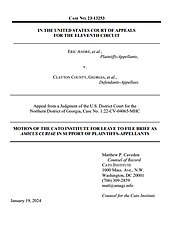Learn more about Cato’s Amicus Briefs Program.
On separate occasions, Appellants Eric André and Clayton English were headed onto the jet bridge to board flights out of Atlanta when law enforcement officers accosted them. The officers flashed their badges, interrogated Mr. André and Mr. English about whether they had illegal drugs, directed them to the sides of the jet bridge, and took their identification and boarding passes. Officers even searched Mr. English’s luggage. Officers found no drugs.
Suspecting that the officers were engaging in racial profiling, Mr. André and Mr. English sued for violation of their constitutional rights. But the district court dismissed their lawsuit, holding that both men merely had “consensual” encounters with the officers and so their Fourth Amendment rights could not have been violated.
Cato filed a brief asking the Eleventh Circuit to reverse that decision. Under the common law doctrines of false imprisonment and arrest that were incorporated into the Fourth Amendment’s original meaning, Mr. André and Mr. English were seized when officers restricted their freedom of movement. William Blackstone warned that the loss of that freedom would spell doom for every other right and courts should prevent that from happening. Cato agrees. Hopefully, so will the judges.

This work is licensed under a Creative Commons Attribution-NonCommercial-ShareAlike 4.0 International License.

